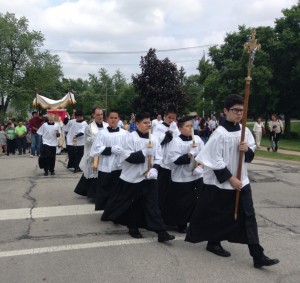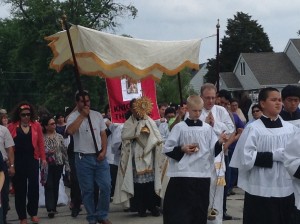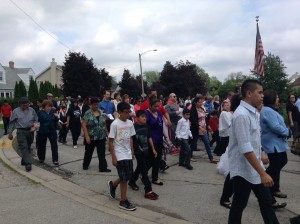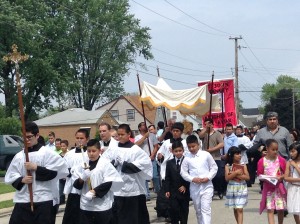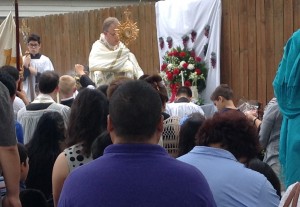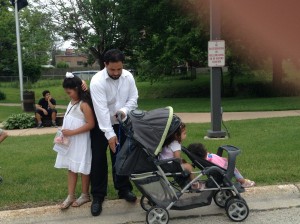Beloved in Christ, if you open up your bible to the Epistle of St. James, you will see that he says this: ‘Is any one among you sick? Then let him bring in the priests of the Church, and let them pray over him, anointing him with oil in the name of the Lord.’
.
This is really a description of the sacrament of Anointing of the Sick, and it was the practice of the first Christians.
We see also, in the gospel, that as Jesus was training his 12 apostles to be priests, he sent them out to pray for the sick and anoint them with oil. ‘And sending them out he gave them authority over unclean spirits, and they anointed with oil many who were sick.’
.
Anointing of the sick used to be called ‘Extreme Unction,’ which means the last anointing. This is because the first anointing is in baptism, the 2nd is at Confirmation, and the last anointing is Anointing of the Sick. Of course people sometimes receive this sacrament more than once. A person could have a serious illness, be anointed by the priest, then get better, and then another time be anointed, when sick again.
.
This holy sacrament is not for those who have a cold or a headache; it is not for people who have a broken arm. It is for someone who has a serious illness or is old or weak – anyone for whom there is at least some risk of death, even if remote. Of course if someone is dying, they should definitely receive this sacrament.
.
Anointing of the Sick was instituted by Christ, to give grace. Our Protestant friends do not have this sacrament, nor do they even believe in it, yet as we read, the Holy Bible teaches that when someone is sick the priest should be called to do this.
.
First let us see today, how Anointing is given. The two important parts of the sacrament are the Oil and the prayers. There are three oils used by the Church: Oil of Catechumen, for those who will be baptized, Sacred Chrism, which is used in Baptism, Confirmation, and Holy Orders; and Oil of the Sick. Our oils are kept in the little bronze receptacle at the side of the sanctuary.
.
When a person is sick, a family member should call the priest. If there is an immediate danger of death, one should call at any hour of day or night. If there is no immediate danger, one should not ‘put off’ calling the priest until the last minute of someone’s life! No way! For one thing, if you wait until the last minute, the priest might be gone away or busy saying Mass or at another emergency; it is also much better that the person is still conscious, so that he can confess his sins or at least hear the prayers of forgiveness. So we should never intentionally wait until the last minute of life to make that call.
.
If the sick person has not gone to confession recently, he should confess his sins first, and then he is anointed on the forehead and the hands. Now this sacrament is primarily for spiritual healing, which we will discuss. But it can cause physical healing. When I was a newly ordained priest, there was a call from the Emergency Room that a parishioner was near death. It was my first Anointing. I had hoped for an easier first one.
.
As I drove to the hospital, my mind raced; I wondered what I would encounter there. Walking into the emergency room, nurses were glad I came, and immediately took me to the room. There I saw the man surrounded by a frenzy of doctors and nurses and blood and syringes. To my surprise, the doctor stepped back and said, ‘Father, go for it.’ I went right over to the bed, absolved him, and with shaking hands, read the prayers, anointed him, and gave the Apostolic Blessing.
.
As the doctors went right back to work, I went home wondering and praying for the man. How did it turn out?
Well, for the next 5 years, that man sat in the front pew of Church on Sunday with his wife, and always said, ‘Father, I was your first one!’
.
I don’t know if the anointing saved his life, or if God’s grace guided the doctors, or both, but I do know that if this sacrament does not always bring physical healing, it always brings spiritual effects, and this is it’s primary action.
.
When a person has a serious illness of the body, it can lead to stress in the soul. For example, when someone is sick, they can become depressed, they can feel very alone, and they may have a fear of death. People are sometimes very able to bear the little crosses of life with patience, but when they become ill, it is not always so easy to keep one’s trust in God. Anointing of the Sick has the supernatural power to change the soul and drive away the anxiety of illness.
.
This sacrament drives away fear of death and judgment, and gives the person the strength to fight the devil, who often comes around when our life is in danger.
Our life is one that imitates Jesus. So when we are in pain, when we are on the cross with Christ, we need this special grace to help us bear it with joy and peace.
.
Many times, a sick person is fearful and worried; but no sooner are they anointed, than they are at peace sometimes even ready to offer their sufferings to God. This infusion of hope and the lifting of the burden of sickness, is a primary effect of this Holy Sacrament. The person is thereby united to the prayers of the Church, and by their sufferings, they too contribute to the saving work of the Church.
.
Under normal conditions, Confession takes away mortal sins, while Anointing of the Sick can take away venial sins. This is why we should make a good confession first. However, let’s say that the person has a sudden medical emergency, and becomes unconscious; then provided that the person is sorry for their sins, Anointing of the Sick for an unconscious person will take away even their mortal sins.
.
For those dying, Anointing of the Sick is a preparation for the new world ahead; it strengthens the soul against the final temptations of the devil, who wishes not to lose anyone to heaven. The body is anointed because it is through the 5 senses that any evil can come to us, and so in this way, the man is cleansed of the remains of sin.
.
Fr. Mersch says that by this sacrament, the person becomes conformed to the dying Christ, and is prepared for the passage to the invisible Church above.
.
When one is very sick, the family must not hesitate to summon the priest to bring this sacrament to their loved one. And a priest, even at the risk of his life, must administer the sacraments to his children who are in extreme need.
.
‘But my father hasn’t been to Mass for many years, he almost never prays.’ ALL THE MORE REASON to call the priest!
.
Older people will say, ‘Can you give the Last Rites’ to my mother? ‘Last Rites’ is a term not used much today. It refers to all of the final sacraments – whatever is possible. In the ideal situation, a dying person would receive 3 Sacraments: a good Confession, Anointing of the Sick, and then Jesus in Holy Communion for the final journey. This would be to receive all of the ‘Last rites.’ Obviously people are not always able to speak to make their Confession, or to swallow, to receive Communion; but if they have Faith, they can always receive the grace of Anointing of the Sick.
.
It goes without saying that the family should be praying with the sick or the dying person. These can be some made-up prayers from the heart, but be sure to also pray the Our Father and the Hail Mary with them, because it is an immense comfort to the dying, to hear the names of Jesus and Mary.
.
[Entrusted to the prayers of St. Pelagia]
